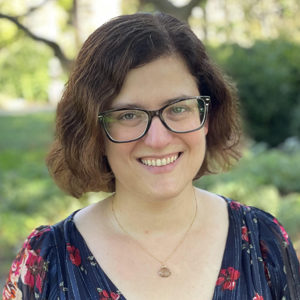Interview With Kristina Saccone
I love when women see a need and take action to meet it. Kristina Saccone is a woman who did exactly that. When Kristina became a caregiver for her mom who has dementia, she looked for books and articles that could provide support and help her navigate what is often be a very isolating and lonely experience. She was to surprised to find little out there to guide her. Kristina knew it would be helpful to have a resource of curated stories about the caretaking journey. So … she created that space: One Wild Ride.
I had the great pleasure of speaking with Kristina about her wonderful project and about the challenges of being a caregiver.
 Diane: Welcome Kristina! I am so grateful to talk to you today. November is National Caregivers Appreciation Month. Appreciations to you!
Diane: Welcome Kristina! I am so grateful to talk to you today. November is National Caregivers Appreciation Month. Appreciations to you!
Kristina: Thank you for inviting me. This project is so dear to my heart, so I appreciate it.
Diane: I love this project. Why don’t we start by you telling us what it’s all about.
Kristina: I started One Wild Ride a few months ago. I’ve been gathering literary stories about people caring for their aging parents or whoever raised them. It’s been part of a project I’ve been working on for a while, a print anthology, and I’m hoping to find a publisher for new stories on the topic.
My mom has dementia. I had read so many amazing previously published stories about this but had to hunt and pick to find them. I love reading lots of outlets, but they don’t always sort stories by topic. The ones I found touched my heart and helped me better understand what was going on in my life and my journey. So though I’ve been querying publishers and am passionate about the anthology, I thought, “Why not create a website where the existing stories can be in one place, and hopefully other caregivers and people who are going through this can read them all in one place too.”
“There Are People Who Want to Read What They’ve Experienced and to See Themselves in These Stories”
 Diane: That’s such a wonderful, wonderful idea. And it may help you land an anthology deal.
Diane: That’s such a wonderful, wonderful idea. And it may help you land an anthology deal.
Kristina: I hope that it raises awareness around it, for sure. And I hope it shows that there really is interest and demand for this.
Diane: There is.
Kristina: I often hear that editors at literary magazines don’t really want more stories about dementia or about dying. A lot of people write along those topics because it’s so emotional. But I really do think there are people who want to read what they’ve experienced and to see themselves in these stories.
Diane: I definitely think there is a demand, but I don’t see many of these stories around. I imagine there’s an element of ageism involved. Unfortunately, the literary world is not immune to ageism.
You mentioned your mom. What are your caretaking responsibilities for her?
Kristina: It’s been a bit of a journey. A few months ago, she moved into an independent living facility. She has a caregiver who helps her most of the day, and we are really fortunate that she can afford these services. It allows me to keep my full-time job and be present for my young son. But I manage everything related to her health, from nutrition and medication to doctors and emergency room visits. There is no real replacement for an involved child or an involved family member. I have three siblings who also help in different ways, and I’m one of two who is local.
“People Express Sympathy When They Hear About It, Which Is Very Welcome, But Eventually Kind of Forget the Situation”
 Diane: I read through all the stories on the website One Wild Ride and the short author interviews. In Thad DeVassie’s reflection, he said, “People around you who aren’t immediately affected eventually slip away. The well- meaning concern is no longer spoken. Caregivers and families are left with an ongoing heavy burden.”
Diane: I read through all the stories on the website One Wild Ride and the short author interviews. In Thad DeVassie’s reflection, he said, “People around you who aren’t immediately affected eventually slip away. The well- meaning concern is no longer spoken. Caregivers and families are left with an ongoing heavy burden.”
I am so certain that’s true. Right?
Kristina: That really landed with me too. People express sympathy when they hear about it, which is very welcome, but eventually kind of forget the situation. I feel like there’s such a distance that’s created. I’ve started saying to people at work that I identify as a caregiver of an elderly parent or an infirm parent. It truly has become a part of my identity. And that’s the thing—it can get forgotten unless you’re really open about it. At the same time, it’s so sad and upsetting, it’s an awful thing to bring up and talk about. I mean, I’m going to cry just thinking about it.
Diane: Of course.
Kristina: Nobody really wants to talk about death. Or any of the precursors to death. There are so many hard things you go through at this stage in life where there aren’t good choices or solutions.
Diane: This is something for which there’s really no fix.
Kristina: Exactly.
Diane: And people can lose patience with that. We’re a very solution-oriented society and one that lives for immediate gratification. “Wasn’t your mom sick last year too? Move on.” It’s that kind of impatience. “Oh, heard that already. Sorry.” I would think that that’s part of the attitude you face.
I’m in my second marriage. My husband and I always laugh because we don’t know how long we’ve been married, eight years, nine years, something like that. But the week after our honeymoon, his elderly mother moved in with us.
Kristina: Oh wow.
“It’s Almost Like Grieving the Loss of a Person Because She’s Not Herself”
Diane: It’s a scary burden having to think about other people’s medication. What if you forget or you mess it up? It’s a big thing. And then there’s the emotional piece of seeing your parent deteriorate.
Kristina: I was very worried about the medication piece and feel an enormous responsibility. And I think bringing her to the doctor and making decisions for someone who has dementia is incredibly difficult. This is something I’ve tried to write about that I haven’t been able to get on paper. I talked to my mom about her end-of-life choices when she made me her health power of attorney, but we assumed that she would be physically unwell, not cognitively unwell. The decline has been so bad over time. You really grieve it. It’s almost like grieving the loss of a person because she’s not herself.
 Diane: It is. It’s the loss of who you knew anyway, the way you knew her.
Diane: It is. It’s the loss of who you knew anyway, the way you knew her.
So let’s talk about writing this grief, this specific type of grief.
Kristina: It’s the only thing I can write about right now, but also I don’t think I’m writing very well about it. I’m okay with that – I’m writing because I need to. Writing is so nurturing, particularly when you’re grieving, and it can go beyond journaling. Not that journaling is a bad thing, but there are very, very expressive ways I’ve been able to write about my experience using literary elements. These are forms that help me better understand my grief. Like metaphor, for example. The decline in my mom’s memory it’s just dying plants, like wilting plants, and I’ve written a lot about that.
“Combining Fact and Fiction Has Freed Me When Writing About Caregiving and Grief”
Often my writing isn’t brilliant, but making those connections has been really meaningful to me. I taught my first workshop with the Crow Collective about a week ago with a group of women who are also caregiving, and I tried to convey that: using literary techniques and getting words on the page is an accomplishment. (Kristina’s next online class with Crow Collective will be on February 11.)
I write both nonfiction and fiction about it too. Some of the stories in One Wild Ride are a mix of both, for example Jamy Bond and Electra Rhodes’ stories. Combining fact and fiction has freed me when writing about caregiving and grief. It allows the story to move ahead and the characters can be who they are – still informed by my experience, even if it’s not completely true. I wrote a story for Molotov Cocktail called The Borrowers, which was one of the top 10 for their Folked Up Flash Competition. It’s a fable about a fading mother mouse. So it’s about what’s happening with my mom though, of course, fictional in many ways.
Diane: Talk about metaphor, right?
Kristina: Yeah. And it’s a horror story. This experience of seeing your parents decline is such a horror.
Diane: It’s horror. It really is.
Tell us about the classes you teach around this.
 Kristina: Well, I just started teaching, so I’ll admit that I’m still pretty new to it. It was so thrilling to meet these caregivers and talk about writing with them. One of the things that I really hope to do with One Wild Ride and also with these classes is to both empower people to write and empower caregivers to connect with one another. Create a community and hear from other people or read and know that they’re not alone.
Kristina: Well, I just started teaching, so I’ll admit that I’m still pretty new to it. It was so thrilling to meet these caregivers and talk about writing with them. One of the things that I really hope to do with One Wild Ride and also with these classes is to both empower people to write and empower caregivers to connect with one another. Create a community and hear from other people or read and know that they’re not alone.
“I Am Passionate About Getting an Anthology of New Stories Out into the World”
Everyone’s experience caring for their parents is singular. It’s going to be different depending on what’s going on with the person in their life, but at the same time, the grief is common, and the feelings are common. I hope that writing about it together is community-building and gives people a place and a space to let that part of themselves come out, to embody that part of their identity.
In the class, I offer some instruction on the craft of flash because that’s what I write and know best. And then we have some prompts and do some readings. It’s been wonderful connecting with caregivers and helping them talk about and open up their stories.
Diane: That’s wonderful. Caregivers definitely need community.
 Kristina: Caregiving is really isolating. It kind of goes back to what Thad was saying about people not really caring seriously about it anymore. But it’s also, your life is so consumed with it. I have resources and I have support in other ways.
Kristina: Caregiving is really isolating. It kind of goes back to what Thad was saying about people not really caring seriously about it anymore. But it’s also, your life is so consumed with it. I have resources and I have support in other ways.
But there are caregivers who are both literally isolated and figuratively isolated, and it’s very lonely. So I’m hoping that even by reading other people’s work, people will find community.
The journal means a lot to me, but I would love to have a book in print too. When I started having these issues with my mom, I Googled it and went on Amazon and tried to find a book to help me understand these complicated feelings. I am passionate about getting an anthology of new stories out into the world, and I really hope a publisher sees the value and helps make it happen.
But in the meantime, the submissions to One Wild Ride are so moving. Also hearing from readers who share that it’s meaningful to them, that’s very powerful.
“I Want to Celebrate That These Journals Elevated These Stories About Caregiving and Grief”
I also want to show support for the literary magazines that originally published the stories in One Wild Ride. That is one of the reasons I’m taking reprints. It is very intentional. I want to celebrate that these journals elevated these stories about caregiving and grief, knowing that not every literary magazine is as welcoming.
Diane: This is such a wonderful gift you’re giving the world. There’s a section on your website that lists ways to help. I’m sure there are people who will read this who aren’t writers but who would like to contribute in one way, shape, or form.
Kristina: Reading and then sharing the stories on social media, even just saying, “I really enjoyed reading this. Could you read it too?” Give the stories a chance. A lot of people don’t want to read sad stories.
Diane: But they’re not all sad. I’m even looking at some of the pieces in the journal. There’s a sadness to all of them, but like in Thad’s piece—he learned something. And Victoria’s, right? I mean, she and her mom were having fun.
Kristina: There’s humor in some of them too.
I don’t know if you follow Roz Chast but she has this amazing book of cartoons about her parents’ aging.
Of course, it’s sad, but it’s hilarious too.
Diane: And it’s okay to laugh. It’s okay to laugh at this.
“I Think There’s Also Something That Can Be Revelatory About These Caregiving Stories”
 Kristina: You can find meaning in many ways, even when something is predominantly sad.
Kristina: You can find meaning in many ways, even when something is predominantly sad.
I just read a new book by Lynn Tillman called Mothercare. It’s an extended essay about caring for her mother until she died. She talks a lot about how hard it is. But she also writes about creating new routines with her mother. For example, celebrating birthdays in a way that they never celebrated before, finding joy in new ways. Tillman’s writing completely changed my perspective on how I might want to celebrate birthdays with my mother. So I think there’s also something that can be revelatory about these caregiving stories.
Diane: I wanted to ask you if there’s anything that we didn’t talk about that you want to mention.
Kristina: I just want to encourage anyone who is going through this to think about writing, whether it is keeping a journal or sharing short experiences, even if it’s in spurts. You don’t have to write for publication. You don’t have to aspire for a Pushcart nomination. Writing is healing, nurturing, and important in itself.
Diane: Yes, Thank you. It was wonderful speaking with you today.
As always, I’d love to hear from you. Please write a comment or send me an email.
Happy Happy Thanksgiving!
See you soon!
XOXOXO
Diane




This is a beautiful interview. I feel so emotional reading it – recognition, here, and in the journal, of experience, feeling, hope, loss, everything around being a carer is so profound. I’m very grateful, Kristina. Huge thanks, Diane for highlighting this wonderful work Kristina is doing.
Huge thanks to you, El, for your generous comment. I love reading your Tweets about your dad and your relationship with him. They always touch me and bring a smile to my face. You are a kind, generous person who, by sharing your own experience, bring light and connection to what can be a lonely and isolating experience. I’m so glad the interview resonated. Thanks again!
This is so important, Diane. Other caregivers were my lifeline when I was dealing with this.
Thanks for sharing that Maureen. So many people are going through this challenge. I’m so glad you had help.
I love this interview and could talk to Kristina for hours about caregiving, feeling alone and also actually being alone (and how people disappear), our death-denying culture, and about dementia. I have published a few poems on dementia because I lost a dear friend of thirty years, “Nana” to my kids, to dementia and have another dear friend suffering from it now. Thank you so much for starting a journal, Kristina, it is so needed. Thank you so much for doing an interview related to Caregivers Month, Diane!
Deirdre, so glad to hear from you on this one. I know you know about caregiving and all it entails. I think you and Kristina would have lots to talk about. Thanks so much for joining in on the conversation.